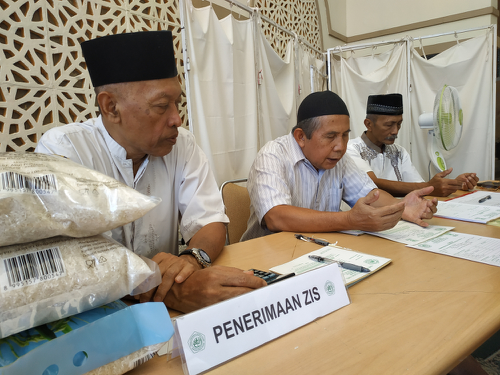Identifying poverty as a factor, Indonesia aims to combat radicalism with improved national zakat distribution
BANDUNG - Indonesia's Ministry of Religious Affairs will work with the National Zakat Board (BAZNAS) to improve the collection and distribution of zakat, identifying poverty as a cause of radicalism.
The obligatory tax is meant for disbursement to eight groups of beneficiaries, or asnaf, including the poor and destitute.
Deputy Minister of Religious Affairs Zainut Tauhid Sa’adi said during the 8th World Zakat Forum in Bandung on Wednesday (November 6) that radicalism and intolerance in Indonesia are a result not only of misunderstanding aspects of Islam, such as jihad, but they are also driven by socio-economic factors. People living in poverty tend to be more easily tempted by radical ideas and actions, he said.
About 9.41% of Indonesians lived below the poverty line at the end of March, according to data from the national statistics body. These 25.14 million people live on an average expenditure of 425,000 Indonesian rupiah ($30) per month.
“Zakat has the potential to reduce at least 1% of the national poverty level per year,” said the deputy minister.
He estimates Indonesia’s zakat potential at around 230 trillion rupiah per year, but said that collection only reached 8 trillion rupiah in 2018, equivalent to only 3.5% of its full potential.
“I believe that if at least 50% of the national zakat collection is channelled to this group, poverty and radicalism will not grow in an emerging Muslim country," he said.
Terrorism expert Robi Sugara told Salaam Gateway “it is not absolutely true” that poverty is the root of the radicalism movement. Robi is the director of non-governmental organisation (NGO) Indonesian Muslim Crisis Centre and a lecturer on terrorism at the public Universitas Islamic Negeri Jakarta.
“I don’t think poverty is the root of radicalism. If so, in Indonesia, with its high national poverty level, our citizens should mostly become terrorists. I think there is no clear causality factor here,” said Robi.
“In fact, other factors, such as corruption, are becoming a more important component of the root of violence,” he added.
Corruption undermines public trust, especially to state institutions, he said.
“For example, if there is a judge’s decision on a case, the public will assume that there is a judicial mafia game. They will judge it as a conspiracy. If the public has no trust and hope for the government, they will look for alternative channels," said the academic.
He said he appreciates the government’s efforts to combat radicalism but said there are other ways of using zakat that may be more helpful, saying zakat should also be channelled to help former terrorism actors post-prison.
“Since they are already labelled as terrorists and face this stigma from society, they usually don’t know how to restart their lives and so it’s easier for them to turn back to their former groups that already share the same views,” said Robi.
“I think if the government want to utilise zakat, they can help them here and consider them as a mustahiq for zakat.”
STRENGTHENING ZAKAT MANAGEMENT
BAZNAS is already reaching a sizeable population among qualified zakat beneficiaries, or mustahiq, according to deputy minister Zainut.
“From BAZNAS central experience where they manage 800,000 mustahiq, 28% of them actually no longer live below the poverty line,” he said. Nation-wide BAZNAS overlooks around 5 million beneficiaries.
BAZNAS’ zakat payment option can be found on its own dedicated payment channel as well as on third-party platforms such as those for e-commerce, e-money, and crowdfunding.
The deputy minister said “a lot of work” must be put in to establish a post-zakat distribution reporting platform.
“After BAZNAS launched its National Zakat Index (NZI), there was no post distribution report platform,” said Zainut
“Data collection from 5 million mustahiq in Indonesia can be done in real-time,” he added.
Currently, only BAZNAS’ central office has real-time dashboard information system, for 800,000 mustahiq. BAZNAS nation-wide overlooks disbursement for 5 million beneficiaries.
The deputy minister said a strong commitment from the government, supervision and clear regulation are needed to strengthen the zakat sector.
“To really reduce poverty, we need strong regulations, a reliable distribution system and a high awareness by Muslims to conduct their zakat obligation,” he added.
(Reporting by Yosi Winosa; Editing by Emmy Abdul Alim [email protected])
© SalaamGateway.com 2019 All Rights Reserved
